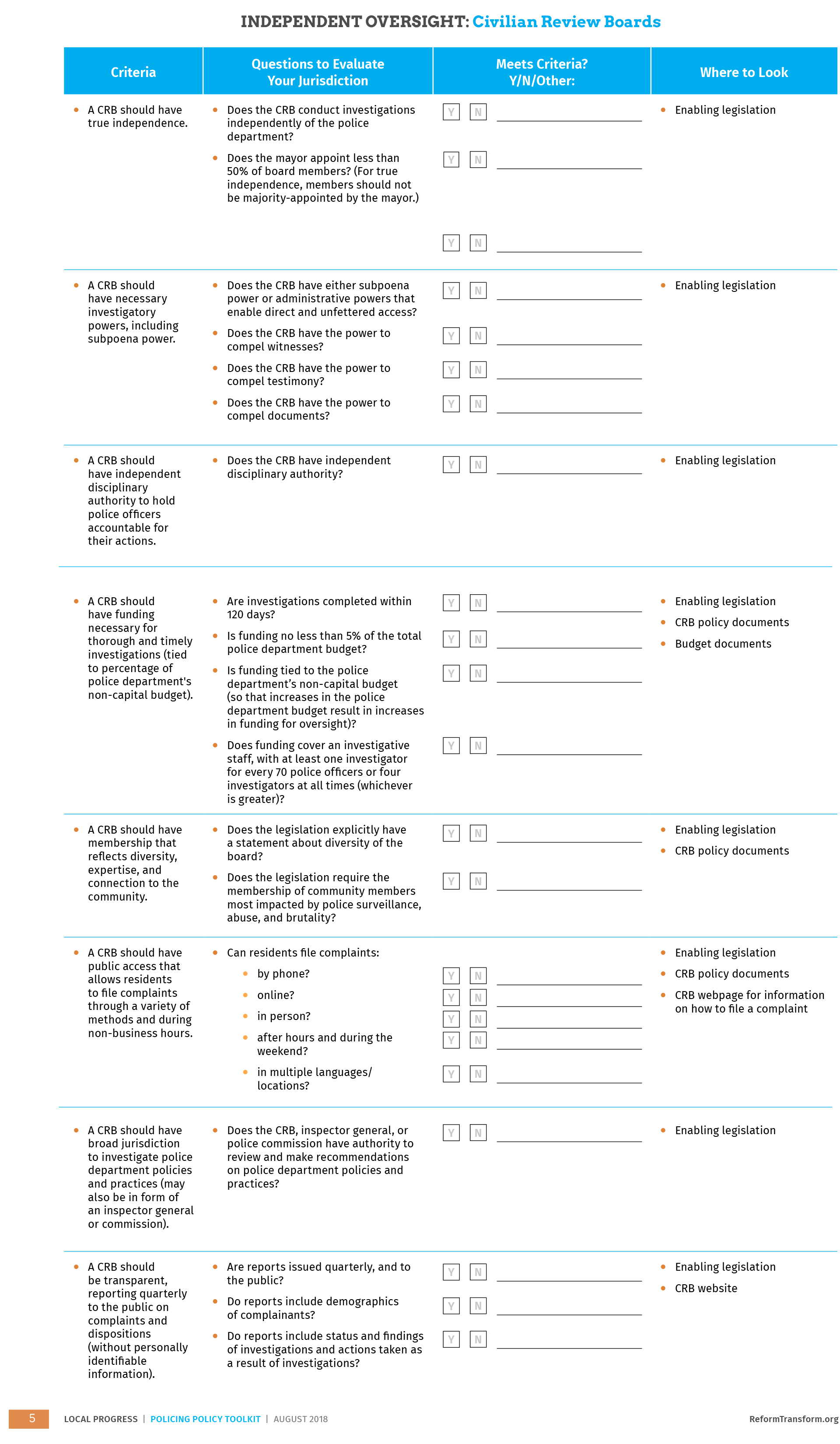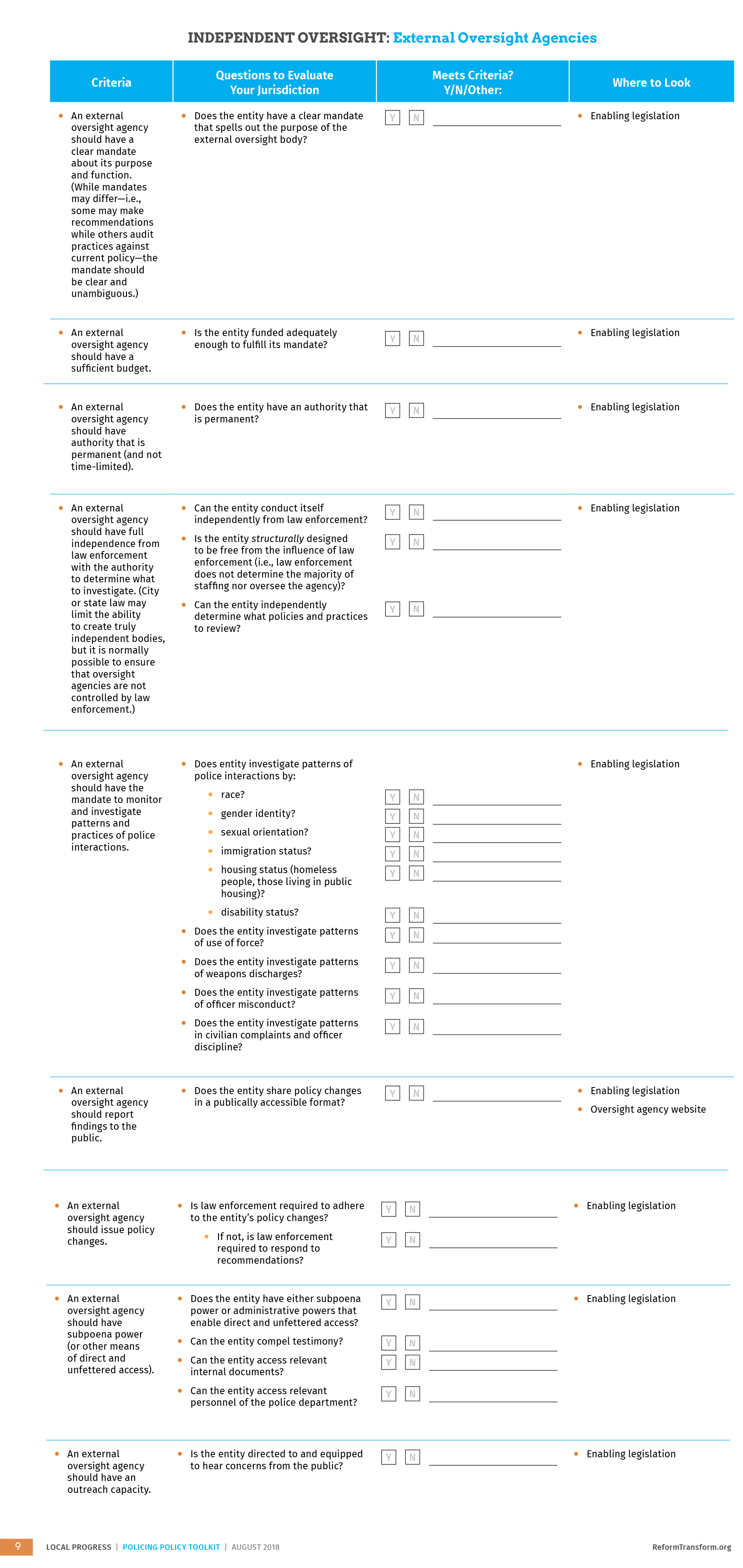Policy Background
Civilian oversight bodies exist to provide independent, civilian oversight of law enforcement. A civilian review board is defined as “an agency that is staffed by civilians, and not sworn officers, charged with investigating civilian complaints” against law enforcement.[1] In addition to civilian review boards, some cities also have inspectors general or oversight commissions, which are third-party government agencies or officials that provide external oversight of law enforcement policies and practices. There are several primary categories of oversight bodies, ranked in order of most to least active:
The first type is granted independent disciplinary authority, in which the board’s recommendations are binding and must be followed.[2]
The second type investigates civilian allegations of police misconduct and recommends disciplinary action to the police chief (but recommendations are not binding).[3]
The third type does not have the power to conduct investigations, but reviews the internal investigations and recommendations made by police, and then makes recommendations to the police chief about whether or not to follow those internal recommendations.[4]
The fourth type allows civilians to appeal the results of internal investigations, while the review board reviews internal police process and makes recommendations to the police based on the internal police investigation.[5]
The fifth type serves in a limited auditor capacity by investigating police department processes for accepting and investigating complaints.[6]
There are now more than 100 jurisdictions across the country with some type of civilian oversight body.[7] However, despite the growing prevalence of civilian oversight in cities across the country, many communities have lost faith in their effectiveness. And understandably so: nationally, between 6 and 20 percent of citizen complaints are sustained (in other words, deemed credible),[8] and in some cities the rates are even lower. Police departments’ own data—often not readily available to the public—paints a “portrait of impunity,” in which the vast majority of complaints are thrown out and few officers are ever disciplined.[9] In Chicago, for example, in the five years preceding an investigation by the Department of Justice (DOJ), only two percent of 30,000 police misconduct complaints were sustained, resulting in no discipline in 98 percent of complaints.[10] Complaints were even less likely to be sustained when made by Black Chicagoans.[11] The DOJ’s investigation unveiled a number of systemic factors contributing to the failures of misconduct investigations, including “an unwillingness to investigate anonymous complaints, provisions in unions agreements, and officers’ ‘code of silence’ aimed at covering up misconduct.”[12]
Effective oversight is only possible if oversight bodies are independent from the police department (so that, for example, officers may not conduct their own internal investigations with no accountability or oversight). Oversight bodies should be representative of communities most impacted by police brutality, adequately funded, granted subpoena power, and equipped with full investigatory and disciplinary power. They should also have the authority to monitor police department policies and to issue binding policy recommendations. A number of jurisdictions, including Seattle, Oakland, San Francisco, and Newark, have started to advocate for review boards with greater power and authority to ensure that officers cannot operate with impunity, including the power to investigate departmental practices, impact hiring decisions, and help identify policing priorities.[13]
The following best practices are categorized as best practices for civilian review boards and best practices for external oversight agencies. However, these powers may rest with either type of oversight body, so long as the criteria is ultimately met between them. For example, a locality may only have a civilian review board and not an external oversight agency, but the civilian review board may be granted the power to monitor police department practices and policies.
Assessing the Landscape
Questions to help assess the current landscape include the following:
- How many complaints have been filed in your jurisdiction versus sustained in recent years? Are complaints sustained at different rates based on race? Are there certain officers or precincts with higher rates of complaints?
- Of all complaints filed, how many alleged excessive force, abuse of force, or offensive language?
- How many complaints result in officer discipline?
Best Practices: Civilian Review Boards
Local elected officials can directly legislate the creation of a strong civilian review board (CRB). The following recommendations build on best practices developed by the Center for Popular Democracy and PolicyLink in the “Toolkit for Promoting Justice in Policing,”[14] as well as those from Campaign Zero[15] and the ACLU of New Jersey.
Best Practices: External Oversight Agencies
In addition to a civilian review board, jurisdictions may establish an inspector general or oversight commission. These entities can aid transparency and monitor the practices and policies of police (as opposed to investigating individual incidents of misconduct).[1] These agencies should be specific to law enforcement and not charged with overseeing the policies of other departments. Local elected officials should have authority to legislate the creation of an external oversight agency. The following recommendations build on best practices developed by the Center for Popular Democracy and PolicyLink in the “Toolkit for Promoting Justice in Policing.”[2]
Lessons from the Field

Council Member Greg Casar
In 2017, the city of Austin began negotiating a new contract with the Austin Police Association (APA), and Council Member Greg Casar saw this as an opportunity to begin to rethink how Austin defines public safety. Casar worked with community leaders to make a push to reject the contract unless eight key police oversight, transparency, and discipline reforms were made.
The negotiations have been ongoing for many months as the Austin City Council has certain authority over specific parts of what they can legislate, while others are mandated to be collectively bargained.
Council Member Casar and the city council voted to reject the negotiated contract in December 2017 because it lacked sufficient gains on increasing police accountability for behavior that adversely impacted residents, and failed to increase transparency around the civilian complaint process. Although through community organizing, the police contract did improve—for example, the new contract allowed for anonymous citizen complaints—it did not go far enough. For example, officers who engaged in non-criminal misconduct could potentially remain immune to discipline of the misconduct was over 180 days old.
As such, the city has opted to do two things. The first is that the city’s Office of Police Monitor is undergoing a current assessment of examples of oversight models in other cities to find something that could be replicated and tailored to Austin. Secondly, the council has continued to stand strong during negotiations, by refusing to renew discretionary police pay stipends until the oversight reforms are achieved.
Resources
- See Udi Ofer’s “Getting it Right: Building Effective Civilian Review Boards to Oversee Police,” for an overview of CRB boards in the 50 largest cities and a description of key components of effective boards: http://scholarship.shu.edu/cgi/viewcontent.cgi?article=1572&context=shlr
- See the National Association for Civilian Oversight of Law Enforcement (NACOLE) for a number of civilian oversight agency profiles: http://www.nacole.org/agency_profiles
- See NACOLE’s overview of police oversight models: http://www.nacole.org/oversight_models
- See the Invisible Institute’s Citizens Police Data Project: https://invisible.institute/police-data/
- See Seattle’s police oversight ordinance: https://seattle.legistar.com/View.ashx?M=F&ID=5256007&GUID=C6C20636-273B-4D07-941C-4E9BD0EE440C
- See Newark’s police oversight ordinance: https://newark.legistar.com/LegislationDetail.aspx?ID=2573481&GUID=13232B4A-53F9-4E99-8440-8FE11FB761B2&Options=&Search=
- See legislation establishing New York City’s Inspector General: http://www1.nyc.gov/assets/oignypd/downloads/pdf/Local-Law-70.pdf
- See legislation establishing the Los Angeles Sheriff Department’s Inspector General (for an example of a clear mandate): https://oig.lacounty.gov/Portals/OIG/Reports/6.44.190___Office_of_Inspector_General.pdf?ver=2017-03-02-162755-183
- For additional reading, see Samuel Walker’s book, “The New World of Police Accountability, “available: http://samuelwalker.net/books/


